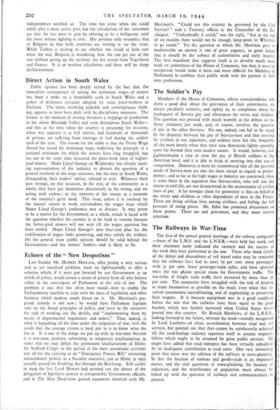Echoes of the "New Despotism"
Last Sunday Mr. Herbert Morrison, after posing a very serious and as yet unsolved problem, went on lightheartedly to offer a solution which, if it were put forward by any Government as an article of policy, would arouse a storm of protest from all who believe either in the sovereignty of Parliament or the rule of law. The problem is one that has often been stated—how to enable the Parliamentary machine to cope with the mass of legislation and other business which modern needs thrust on it. Mr. Morrison's pro- posed remedy is not new ; he would have Parliament legislate only on the broad principles of policy, and leave to the executive the task of working out the details, and "implementing them by means of departmental regulations and orders." That, indeed, is what is happening all the time under the exigencies of war, with the result that the average citizen is hard put to it to. know what the law is. It is one of the things we put up with in war-time because it is war-time, perforce submitting to temporary totalitarianism in order that we may defeat the permanent totalitarianism of Hitler. Sir Stafford Cripps in the period of his most sensational activities was all for the carrying of an "Emergency Powers Bill," entrusting extraordinary powers to a Socialist executive, just as Hitler in 1933 actually passed his Enabling Act through the Reichstag. Still earlier in 1929 the late Lord Hewart had pointed out the abuses of the delegation of legislative powers to irresponsible Government officials, and in The New Despotism quoted arguments identical with Mr. Morrison's. "Could not this country be governed by the Civil Service?" said a Treasury official to the Chancellor of the Ex- chequer. "Undoubtedly it could," was the reply, "but at the end of six months there would not be enough lamp-posts in Whitehall to go round." Yet the question to which Mr. Morrison gave so inadmissible an answer is one of great urgency, so great indeed that it should be the subject of authoritative and early inquiry. The best expedient that suggests itself is to devolve much more work on committees of the House of Commons, but that, it must be recognised, would make it more and more difficult for Members of Parliament to combine their public work with the pursuit of their own professions.


























 Previous page
Previous page